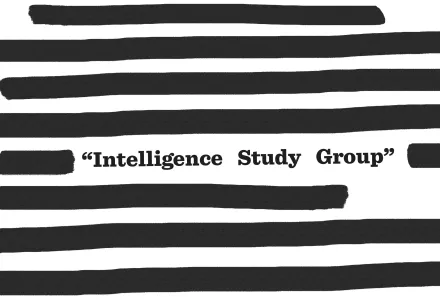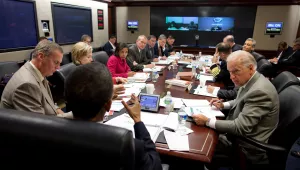INTELLIGENCE STUDY GROUP
Harvard Belfer Center’s Intelligence Project
9 February – 27 April | Spring 2023
Thursdays, 4:30-6:00pm
Classified Location within HKS
Study Group Co-Convenors:
Dr. Michael Miner, Harvard Lecturer and Intelligence Project Associate
Dr. Calder Walton, Intelligence Project Research Director
Dr. Maria Robson-Morrow, Intelligence Project Program Manager
Contact Emails:
Calder_walton@hks.harvard.edu
Miner@g.harvard.edu
Overview:
The Intelligence Study Group is designed for Harvard students considering careers in government or the private sector as well as those interested in a broad introduction to intelligence. Over the course of 11 sessions, participants study fundamentals, history, methodology, and organizations. The group uses case studies, scholarly works, and vibrant discussion to examine how intelligence enhances decision-making, supports policy, where it fails, and the differences between democracies and one-party states. Sessions are co-convened by members of the Belfer Center Intelligence Project including Harvard Lecturer Dr. Michael Miner, Intelligence Historian Dr. Calder Walton, and Project Manager Dr. Maria Robson-Morrow. In addition, many sessions feature special guests from the Belfer Center Intelligence Project's core group of fellows, offering deep practitioner experience and insight on world affairs.
Participation is limited to 40 students determined by application. The application will remain open until February 1 with initial decisions shortly thereafter.
Core Text: Lowenthal, Mark M, Intelligence: From Secrets to Policy, 9th edition (2022). We will provide students with an electronic copy.
Key Learning Outcomes:
Participants will:
- Gain an understanding of the intelligence cycle and its relevance to the government and private sector, including the relationship between intelligence professionals and their policy maker customers.
- Learn major intelligence collection disciplines and their application to analytical problems faced by governments and private sector.
- Apply analytic methodologies and identify common impediments to accurate intelligence analysis.
- Develop understanding of covert action principles and techniques and assess their relevance and limitations.
- Examine counterintelligence issues to include insider threats and cyber espionage.
- Explore the use and abuse of intelligence by governments-- both democratic and dictatorial-- and the impact that intelligence can have on international affairs.
- Assess present-day intelligence and national security crises through lens of historical precedents.
- Examine applications of intelligence beyond government agencies.
- Discuss why intelligence failures occur and what can be done to prevent them.


